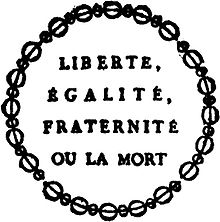Disputatio:Liberté, égalité, fraternité
Latest comment: abhinc 13 annos by Andrew Dalby

It should be in french, since it was not said in latin. In this context, the translation should be in accusative.--24.107.235.195 15:13, 13 Martii 2010 (UTC)
- Slavic languages translate it using nominative, not accusative. What about other inflecting languagaes? --Gabriel Svoboda 18:08, 15 Martii 2010 (UTC)
- Anonym, you need to give a citation. It is not clear from the French or English Wikipedias in what context this phrase was first said. Maybe, had the speaker been speaking Latin, he would have put these words in the nominative. How can we know? Andrew Dalby (disputatio) 18:18, 15 Martii 2010 (UTC)
- I think the main issue objected to is that the original quotation is in french; so who are we to decide which way it was used originally? For example, in the image attached above the reference would indeed parallel "liberty or death", but it is unclear that this is the same usage that is in the french republic logo. --Rafaelgarcia 18:29, 15 Martii 2010 (UTC)
- Coming back to this, and dropping the issue of the accusative (which was never clarified), I agree that if the words have not been published in this form in Latin, our pagename and first lemma should be in French (followed by a Latin translation). Mutatis mutandis, this is how the English page deals with it. If no one disagrees, I'll move it. Andrew Dalby (disputatio) 14:10, 17 Septembris 2011 (UTC)
- The Latin phrase is all over the net. It's a Masonic phrase, says one author. Also, it appears in Druckort Mannheim: Mannheimer Verleger und ihre Drucke von 1608 bis 1803 (see Google Books). IacobusAmor 14:23, 17 Septembris 2011 (UTC)
- That last reference is no use (in my jurisdiction). Google Books gives me only a snippet view, so I can't see in what context or from what source the phrase comes. The other citation you give looks like a forum page and not reliable. If you can find a good source, please add it in the footnote on the page. Then there'll be no need for the move I suggested. Andrew Dalby (disputatio) 14:36, 17 Septembris 2011 (UTC)
- The Latin phrase is all over the net. It's a Masonic phrase, says one author. Also, it appears in Druckort Mannheim: Mannheimer Verleger und ihre Drucke von 1608 bis 1803 (see Google Books). IacobusAmor 14:23, 17 Septembris 2011 (UTC)
- Coming back to this, and dropping the issue of the accusative (which was never clarified), I agree that if the words have not been published in this form in Latin, our pagename and first lemma should be in French (followed by a Latin translation). Mutatis mutandis, this is how the English page deals with it. If no one disagrees, I'll move it. Andrew Dalby (disputatio) 14:10, 17 Septembris 2011 (UTC)
- I think the main issue objected to is that the original quotation is in french; so who are we to decide which way it was used originally? For example, in the image attached above the reference would indeed parallel "liberty or death", but it is unclear that this is the same usage that is in the french republic logo. --Rafaelgarcia 18:29, 15 Martii 2010 (UTC)
- Anonym, you need to give a citation. It is not clear from the French or English Wikipedias in what context this phrase was first said. Maybe, had the speaker been speaking Latin, he would have put these words in the nominative. How can we know? Andrew Dalby (disputatio) 18:18, 15 Martii 2010 (UTC)